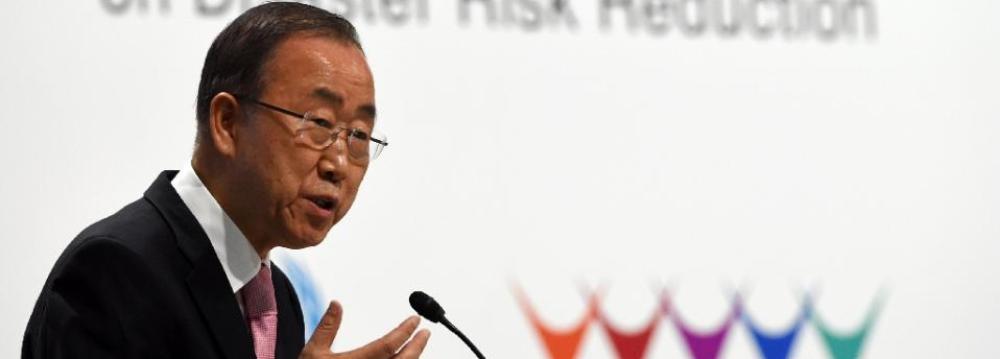Policymakers gathered for a ten-yearly meeting on disaster risk reduction Saturday, with hopes high that the conference in tsunami-hit Japan might provide a springboard for efforts to tackle natural disasters and costly climate change.
The meeting came as a huge tropical cyclone smashed into Vanuatu in the South Pacific, terrifying residents and causing fears Saturday that dozens of people may have died, AFP reported.
UN Secretary General Ban Ki-moon said he had met the president of Vanuatu that morning and conveyed “our deepest condolences” as well as solidarity with the people of the archipelago.
“What we are discussing here today is very real for millions of people in the world,” he said in a speech.
Ban, who has highlighted the rise in extreme weather as global warming has accelerated over the past 10 years, also said: “Disaster risk reduction is a front-line defense against the impacts of climate change.”
“It is a smart investment for business and a wise investment in saving lives,” he said.
A report by the UN Office for Disaster Risk Reduction (UNISDR) said global economic losses from disasters cost an average of $250 billion to $300 billion annually.
“Two thirds of natural disasters come from climate change,” French Foreign Minister Laurent Fabius told AFP ahead of his attendance in the conference.
Fabius is president of the COP 21 conference on climate change, which will be held in Paris in December. “A success in Sendai may prefigure that of Paris,” he said, adding that he wants to draw up a scheme in which all territories and vulnerable populations have a disaster early warning system.
In a conference speech, Fabius said more than 70 countries were identified as particularly vulnerable and exposed to “extreme weather events” -- typhoons, torrential rain, storms and sand or snow.
The conference is being held in the northeastern city of Sendai, days after Japan marked the fourth anniversary of a 9.0-magnitude earthquake. The undersea quake on 11 March 2011 triggered a tsunami that killed around 19,000 people, and a nuclear disaster.
“Since taking office, I have been visiting the disaster-hit areas almost every month,” Japanese Prime Minister Shinzo Abe said.
Abe also pledged $4 billion in foreign aid in the four years to 2018 for disaster prevention, including infrastructure-building, weather satellites and education of 40,000 community leaders.
On Friday, World Bank President Jim Yong Kim stressed the importance of finding ways to finance hugely expensive programs.


